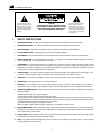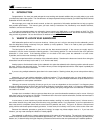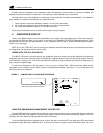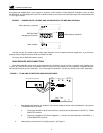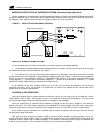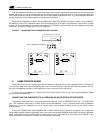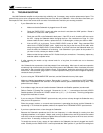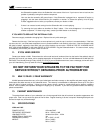
11. TROUBLESHOOTING
Your M&K Subwoofer amplifier circuit provides high reliability, and, if necessary, easy modular replacement of parts. This
guide will help you to solve or diagnose most problems that can occur with your Subwoofer. In the event that a fuse blows, you
must replace it with a fuse of the correct value to avoid a fire hazard and to maintain your warranty protection.
1. If your Subwoofer has no output:
a. Make sure that the Subwoofer is plugged into an AC outlet.
b. Check the "BASS LEVEL" control and make sure that it is set above the "MIN" position. Rotate it
clockwise if it is set to the "MIN" position.
c. Check the red LED on the Subwoofer's back panel. If the LED is not lit, check the AC fuse next to
the LED. Unplug the Subwoofer before changing the fuse. See instructions on Page 12. If the
element inside the fuse is broken, replace the fuse. If it blows again, contact your dealer or M&K.
d. If the red LED is lit, try this test: Turn the "BASS LEVEL" control to "MIN". Plug a standard RCA
cable into the "FROM PREAMP" jacks. Lightly touch the plug at the free end of the cable, while
slowly turning the "BASS LEVEL" control clockwise. If you hear noise from the Subwoofer when you
touch the cable, the Subwoofer is functioning. Look elsewhere in your system for the problem. If
you hear no noise, contact your dealer or M&K.
e. Make sure that the input cables are OK. Double check your connections. If necessary, replace any
defective cables or speaker wires.
2. If, after operating the woofer at high volume levels for a long time, the woofer cuts out or becomes
intermittent:
Your Subwoofer has a protection circuit that protects it from overheating. After hours of continuous operation
at extremely high volume levels, this circuit may kill the power to the Subwoofer. When it activates, the sound
may switch in and out rapidly, with a fluttering sound. If this happens, unplug the unit and let it sit for at least
half an hour. After that time, plug it back in. It should operate normally. If you find this happens frequently,
contact the factory for advice.
3. If you are using the "FROM AMPLIFIER" terminals, and the Subwoofer has very little output:
Make sure that the input cables are in phase. Reverse the (+) and the ( — ) connections for ONE CHANNEL
ONLY at the "FROM AMPLIFIER" terminals. If the problem remains, put the cables back as they were. Then
perform the test in Step 4.
4. If the midbass range (the area of transition between Subwoofer and Satellite speakers) sounds weak:
Refer to Section 5, Phasing Test, on page 8. Reverse the (+) and ( — ) connections at the back of BOTH
Satellite speakers, OR switch the "PHASE" switch from (+) to ( — ) or vice versa. The wiring configuration
that gives the most bass is correct.
5. If you are using the "FROM PREAMP" input terminals, and you hear a thump through the Subwoofer every
time you turn the system on:
Either the preamp, receiver, or surround sound processor is generating the thump, and the Subwoofer is
reproducing it. To eliminate this problem, switch to the speaker wire "FROM AMPLIFIER" input terminals.
6. If you hear a persistent hum or buzz through the Subwoofer:
Because the Subwoofer reproduces the 60 Hz hum frequency, it is often blamed for causing hum that
originates elsewhere in the system. Always avoid running all speaker wires and RCA interconnect cables
near to AC cords and component power supplies.Wires and cables running close to AC lines are a common
source of hum. If necessary, reroute your cables.
To identify the source of hum, remove all input cables to the Subwoofer, but leave it plugged into the AC
outlet. Carefully turn the "BASS LEVEL" control up towards the "MAX" position. If you hear hum coming from
POWERED SUBWOOFER
10





